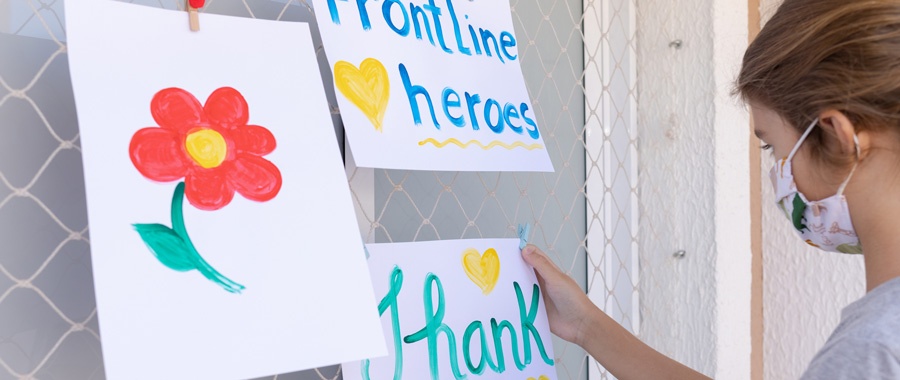In the midst of the current global pandemic, the Bahá’í teachings offer profound insights, particularly through the lens of detachment and compassion. These concepts serve as essential tools for navigating the trials and tribulations brought about by the coronavirus. The crux of this exploration lies in understanding how both detachment and compassion operate symbiotically, enriching the human experience while fostering resilience during testing times.
Detachment, as articulated in the Bahá’í writings, refers to a state of emotional independence from worldly possessions, status, or any transient phenomenon. It is not a call for apathy or disengagement but rather an invitation to cultivate a perspective that transcends the mundane. In the context of the pandemic, detachment encourages individuals to reassess their priorities and reflect on what is genuinely meaningful. By fostering a sense of detachment, one can mitigate anxiety related to loss and uncertainty that the pandemic amplifies.
In such crises, the inclination to cling to past comforts, lifestyles, or securities becomes apparent. However, the Bahá’í principle of detachment prompts an introspection that allows individuals to embrace change—not as a source of despair, but as an intrinsic part of existence. This shift in perception can yield a profound transformation, allowing individuals to focus on the intrinsic values of human connection and spiritual growth rather than materialistic concerns.
Moreover, the practice of detachment breeds resilience. When individuals learn to relinquish their hold on material possessions and transient successes, they become more adaptable to the vicissitudes of life. This adaptability manifests not only in personal well-being but also in community engagement. A detached mindset creates fertile ground for innovation, empathy, and resourcefulness in response to challenges posed by the pandemic.
However, detachment alone is insufficient; it must be harmonized with compassion. Compassion, as a foundational Bahá’í virtue, emphasizes the importance of human interconnectedness. In times of crisis, empathy becomes a driving force that fosters collective healing. The pandemic has illuminated the vulnerability of humanity—reminding us that we are all threads in a larger tapestry. Compassion compels individuals to recognize the shared plight of others and encourages altruistic actions to alleviate suffering.
The duality of detachment and compassion is particularly significant during the pandemic. While individuals may detach from their own individual struggles and material woes, they simultaneously cultivate a deep sense of solidarity with those who suffer. This paradox underscores the essence of Bahá’í teachings: the ability to experience personal growth and spiritual elevation while remaining inextricably linked to the collective experience of humanity.
As communities grapple with the repercussions of COVID-19, the principles of compassion encourage acts of kindness—whether through volunteering, supporting local businesses, or simply reaching out to those who may be isolated. The Bahá’í perspective affirms that such actions not only serve others but also reward the giver with an elevated sense of purpose and fulfillment. The act of giving becomes a conduit through which individuals can express their detachment from selfish desires, embodying a compassionate spirit that resonates with the essence of humanity.
In light of these teachings, it becomes essential to recognize the interplay between detachment and compassion. Detachment functions as a lens through which we may examine our motivations while engaging in acts of compassion. Individuals who free themselves from the burdens of attachment are often better positioned to respond empathetically to the needs of others. This interconnectedness highlights a vital truth: personal enlightenment is inherently linked to the betterment of society.
The current crisis also beckons a reevaluation of the traditional societal structures that often exalt individualism over collective well-being. Detachment, when practiced earnestly, fosters a communal mindset. Those who embrace detachment can envision a world where resources are shared equitably, where empathy is prioritized, and where compassion transcends geographical and cultural barriers. This reimagining of societal norms is essential for creating a more just and compassionate world, wherein the needs of individuals and communities are harmonized.
Furthermore, the act of cultivating detachment prepares the soul for deeper spiritual inquiries. This readiness is pivotal during times of uncertainty. It provokes contemplation on existence’s purpose, human connection, and the broader implications of our actions. Such spiritual awareness encourages a profound connection to the community, allowing individuals to respond to the pandemic not merely with pragmatism but with heartfelt compassion.
The dual response of detachment and compassion offers a blueprint for navigating the complexities of the current era. It invites individuals to shift their perspectives away from fear and isolation towards hope and unity. By prioritizing spiritual principles over materialism, one cultivates a sense of inner peace and resilience that can withstand external turmoil.
In conclusion, the intertwined practices of detachment and compassion not only resonate within the Bahá’í teachings but also offer a transformative response to the challenges of the coronavirus. By fostering a mindset that embraces detachment, individuals can alleviate personal anxiety while simultaneously strengthening their commitment to the well-being of others. Similarly, the practice of compassion nourishes the soul and uplifts the collective spirit. As we collectively traverse this unprecedented period, may these teachings guide us towards a reality where both detachment and compassion illuminate our path, fostering a more resilient and empathetic global community.
